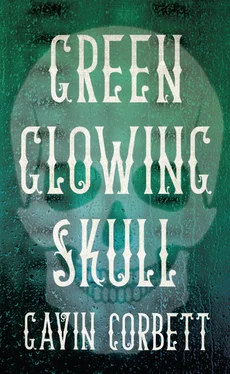Gavin Corbett
Green Glowing Skull
A round unvarnished tale is that delivered to our representative by Mr. J.F. McCormack, the Irish tenor, who has just returned from St. Louis. Mr. McCormack’s narrative is a model of moderation, and contains ample internal evidence that he has exaggerated neither in one direction nor the other. From what came under his own observation it is plain that there were at least a couple of disgusting exhibitions of stage-Irishman antics … If the matter ended at what Mr. McCormack saw himself it would appear that there has been a good deal of high colouring in the charges levelled against the management of the theatre. The narratives of Mr. Digges, Mr. Ewing, and Miss Quinn, of the Irish Literary Theatre, have, however, yet to be obtained, and it may well be that they will supplement the facts related by Mr. McCormack.
From a report in The Dublin Evening Mail, July 21, 1904
A thought … will fly from us and only return again in the darkness crying in a thin, childish voice which we may not comprehend until, with aching minds, listening and divining, we at last fashion for it those symbols which are its protection and its banner.
JAMES STEPHENS, The Crock of Gold
Rickard Velily’s first job in New York was as a reporter for a small local newspaper. He did not stay long in the job because it was apparent that the other people who worked in the newspaper were doing so as a sort of retirement project. He felt guilty spending time with them when, after all, he had fled his elderly parents in Ireland. The stories the newspaper wanted him to investigate seemed designed to frighten him off New York. In his first week he was asked to write about the city’s wild shih-tzu population. It was said that a person was never more than twenty feet away from a shih-tzu in New York. A small number of these shih-tzus were the creatures that looked like paper lanterns that were jogged around on the ends of leashes but most shih-tzus in New York were wild creatures with orange in their beards that lived in pipes under the street. Rickard could not find evidence to prove that any of this was true. The proprietor of the paper was a billionaire’s widow who involved herself in its newsroom affairs because she felt she owed something to society. She had come to New York as a child during the golden and only age of airship travel and she had an ambition to bring back this method of travel. Somebody put it to her that the gases that had been used in airships were dangerous. She said she would not use combustible gases in her airships but normal air filtered of the heavier pollen released by genetically modified crops and urban tree cultivars. Before she had a chance to rope Rickard in in some way on this folly or on some other aspect of her life he was gone.
Now he was idle and, thinking of things he could do to occupy himself, he settled on trying to realise a recent and half-baked ambition to become a singer. Lately he had discovered he had not only a certain unrefined talent for singing but a repertoire of songs within him that he had not known was there. All of this emerged on his last night in Dublin when his parents put on the traditional emigrant’s wake. This had been an unexpected move on their part because his father did not have much of an attachment to Irish traditions and his mother had a learning disability. To the last minute they misunderstood why he was leaving for America. They thought it might have been because he was angry over his sweetheart. He was angry over his sweetheart, it was true, but people do not move away from the sources of their anger unless they have been told to do so by a counsellor or a court. No, he left for America mainly because of his parents: he had been an only child and he did not want to have to care for them and he could not suffer to see them decline. About his absence from their lives, he hoped that they would remain healthy enough to care for one another to the end of their days, and that they would die more or less simultaneously. He comforted himself with the thought that they had good neighbours and many relatives, and that he was not, in any event, very entertaining company for them.
He did not like to think about his parents now because thinking about them, and how they had driven their son to the brink of suicide and ultimately America, made him feel like a tragic cabbage-scented character in an Irish rural drama. But happily there was another reason for leaving Ireland that he could dwell on, and this reason was wholly of the modern world.
In the end, leaving his parents in Dublin had proven not as difficult as leaving his job in Dublin. The company that Rickard had worked for in Dublin was called Verbiage. It specialised in ‘the mining and re-purposing of online text’. Only two people had worked for Verbiage — he had been the familiar of a man who looked after all the computer and technological aspects of the job. Quite suddenly Rickard had come to loathe the tasks being asked of him, and the feeling would not let go. There had been no possible way to move sideways within the company with just the two of them working there, and so to leave his position he had to leave the company, and the only good reason he could give for leaving the company was that he wanted to leave the country, ‘to explore new horizons’, etcetera. His boss was upset to hear this, and tried to convince Rickard to stay. He asked him wasn’t he a little old to be starting a new life abroad, alone, which only hardened Rickard’s resolve all the more, and not because he wanted to prove that he was young (which he proudly was not; he was forty-one), but because he felt that his boss (who was twenty-six) was being ageist, and he wanted to show that a forty-one-year-old was just as capable of starting again, abroad, alone, as a young person was. His boss, again and again, and finally (with his face in his hands), said that Rickard was irreplaceable, and that he would be admired and appreciated in time. ‘But this is just the problem,’ Rickard did not say. At the end of the exchange Rickard realised that he had committed himself to leaving the country, and that the unpleasant sensation he now had (with eyes closed) was one of floating in or falling through space, his insides pressing against him in all sorts of new ways, and that he was about to be reborn. He put his hands to his face just as his boss had done, cried with him, felt his face become hot and wet, opened his hands, and enjoyed the fanning of circulated air.
Alone, again, abroad, in his accommodation in New York, he understood that one of the reasons he had left his newspaper job in New York was that he was worried it might have taken a similar turn to his job in Dublin. The pattern would have gone something like this: he would recognise a sarcastic and assertive tone in his voice, and he would only have to find this tone once, as surely he would, because it was easy to be sarcastic and assertive in writing, and it was not so much that he would hit on this tone as slip down into it, and he would find it fun to express himself in this way for a while. And his editor, and the billionaire’s widow, would see something of value in it, and before long he would be asked to condemn seven or eight different people, cakes, films or pieces of street furniture a week. The seven or eight different subjects would be his to choose, but he would discover that it was hard to come up with things to have an opinion about every week: he was simply not opinionated about enough things. Once he had decided on what he would be opinionated about, however, the words of opinion would come easily. And then he would become nauseated by his false disgust or disapproval or cynicism, and every time his actual bile would rise at this false bile in print he would look at his byline photograph, which would capture nothing of the real contours of his head. He would hate this person, and this person would have hated him if he had existed. He believed these phenomena — graphics, with lives behind them — were sometimes known as ‘avatars’.
Читать дальше
Конец ознакомительного отрывка
Купить книгу












